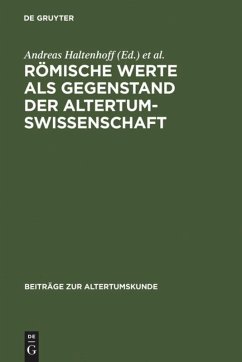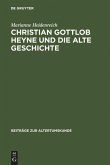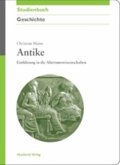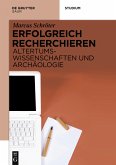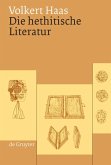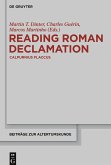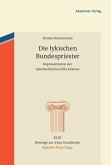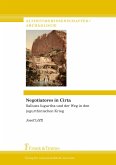Are the Roman values focused upon above all by Latinists in the first half of the 20th century, still relevant to the classical studies of today, or can they, in view of new research approaches and interdisciplinary discourse, still be of interest? This volume, the result of an "Institutionalism and Historicity" special research area seminar at Dresden Technical University, discusses this question in a productive manner. Eleven contributions, written by classical philologists, ancient historians and classical archaeologists, offer a range of critical surveys as well as on-going conceptual ideas and concrete individual studies.
Sind die römischen Werte, denen sich vor allem die Latinistik in der ersten Hälfte des 20. Jahrhunderts zugewandt hat, als Gegenstand der Altertumswissenschaft heute überholt, oder können sie im Horizont neuer Forschungsansätze und interdisziplinärer Diskurse weiterhin Interesse beanspruchen? Der Band, hervorgegangen aus einer Tagung am Sonderforschungsbereich "Institutionalität und Geschichtlichkeit" der TU Dresden, setzt sich mit dieser Frage produktiv auseinander. Elf Beiträge, verfasst von Klassischen Philologen, Althistorikern und Klassischen Archäologen, bieten sowohl kritische Bestandsaufnahmen als auch weiterführende konzeptionelle Überlegungen und konkrete Einzelstudien.
Sind die römischen Werte, denen sich vor allem die Latinistik in der ersten Hälfte des 20. Jahrhunderts zugewandt hat, als Gegenstand der Altertumswissenschaft heute überholt, oder können sie im Horizont neuer Forschungsansätze und interdisziplinärer Diskurse weiterhin Interesse beanspruchen? Der Band, hervorgegangen aus einer Tagung am Sonderforschungsbereich "Institutionalität und Geschichtlichkeit" der TU Dresden, setzt sich mit dieser Frage produktiv auseinander. Elf Beiträge, verfasst von Klassischen Philologen, Althistorikern und Klassischen Archäologen, bieten sowohl kritische Bestandsaufnahmen als auch weiterführende konzeptionelle Überlegungen und konkrete Einzelstudien.

